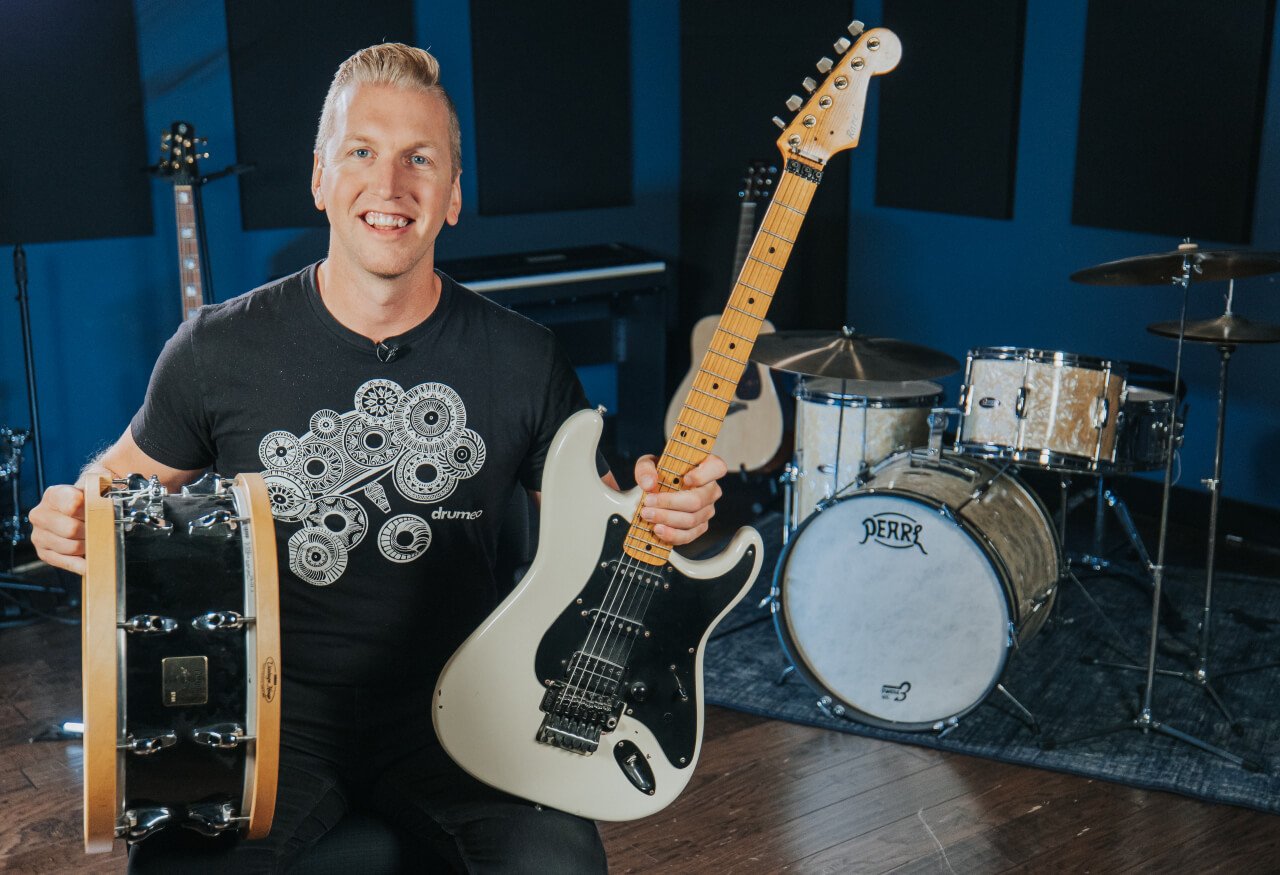
TL;DR: Learn drums if you love rhythm and want to rock out with energy. Learn guitar if you want to write songs.
So you want to play an instrument and you’ve narrowed it down to either the drums or the guitar. But how do you make that final choice?
Both instruments have the cool factor. And both will give you the freedom to play the music you love.
This is a big decision, so in this article we’re highlighting the challenges and advantages of learning to play either instrument.
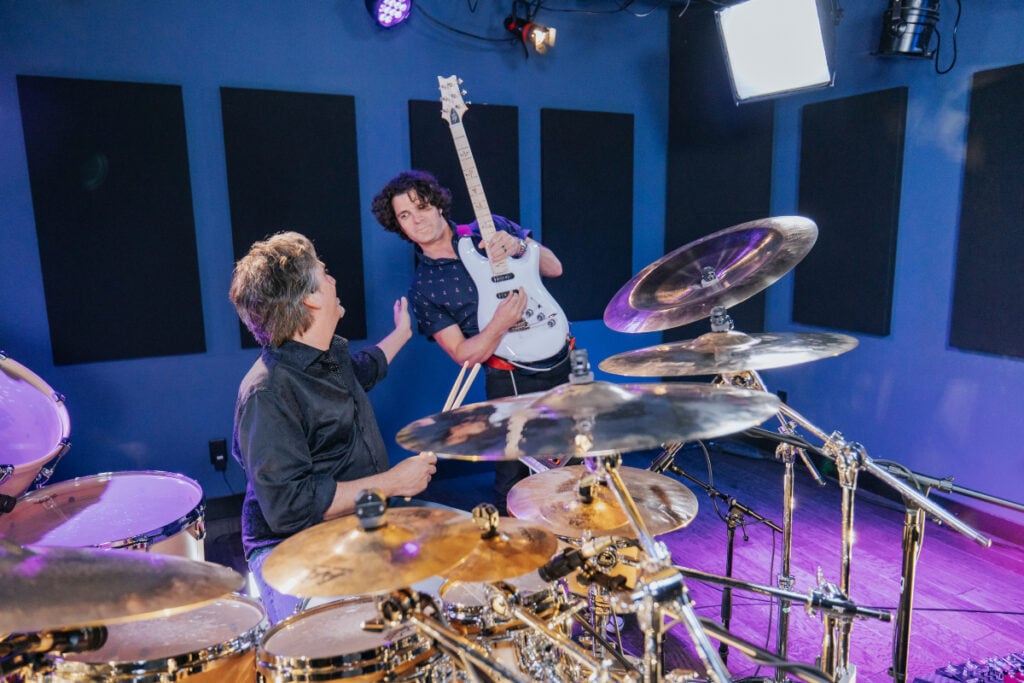
Let’s kick things off by answering the most important question:
Drums are harder to learn because you need to master three-way coordination just to get started. But any drummer will tell you it’s worth it.
When you’re first starting out, you should be able to play a simple beat on the drums – even if it’s just the bass drum and snare drum. However, you may not be able to keep reliable time, which is key for a drummer. It can also take a while to master the coordination of your first three-limb drum beat.
On guitar, you can get a nice sound without knowing what you’re doing, and you can start playing a few basic chords and scales relatively quickly. It’s less important that your rhythm is perfect, but it’s more important that you hit the right notes.
In both cases, there will be times when progress comes quickly and times when progress feels uncomfortably slow.
Both instruments pose a different set of challenges, which results in two distinct learning curves. In the end, one isn’t harder to learn than the other; they’re just two separate paths to musical freedom and fun!
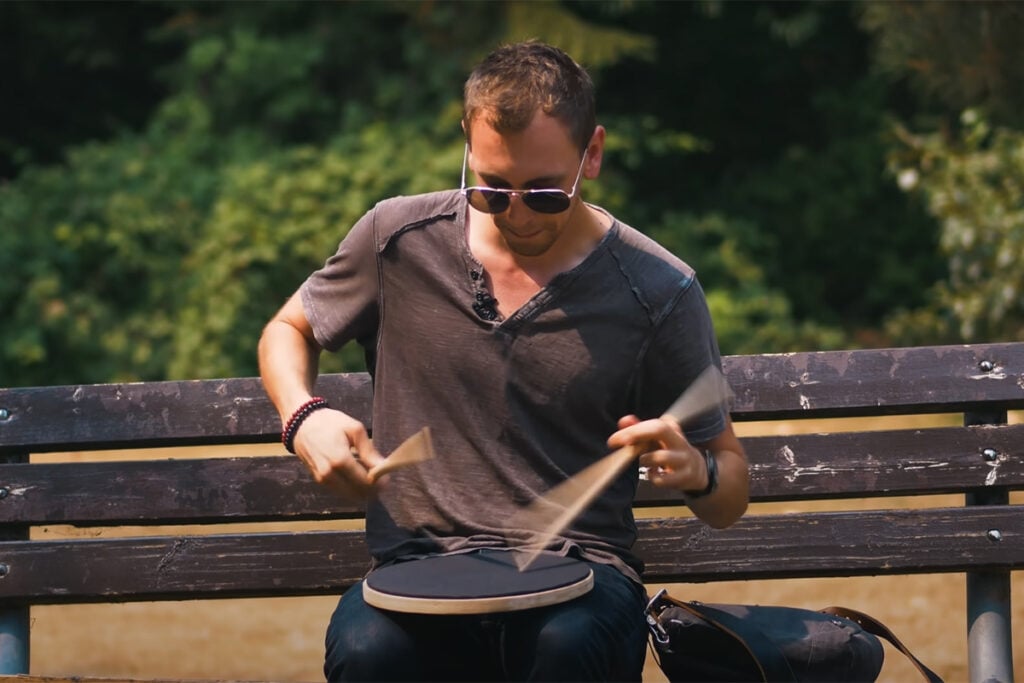
Developing a good sense of rhythm is helpful for learning other instruments
The drums are a perfect secondary or supportive instrument because they ignore melody and harmony and hyper-focus on rhythm. As you become a better drummer, your sense of timing and feel will also improve when you pick up any other instrument.
Mastering one beat opens up a ton of other options
Like any other instrument, the drums are hard to master. And it can be tough to get your hands and feet to listen to you at first. However, once you nail the initial coordination of your first drum beat, learning other beats will get easier.
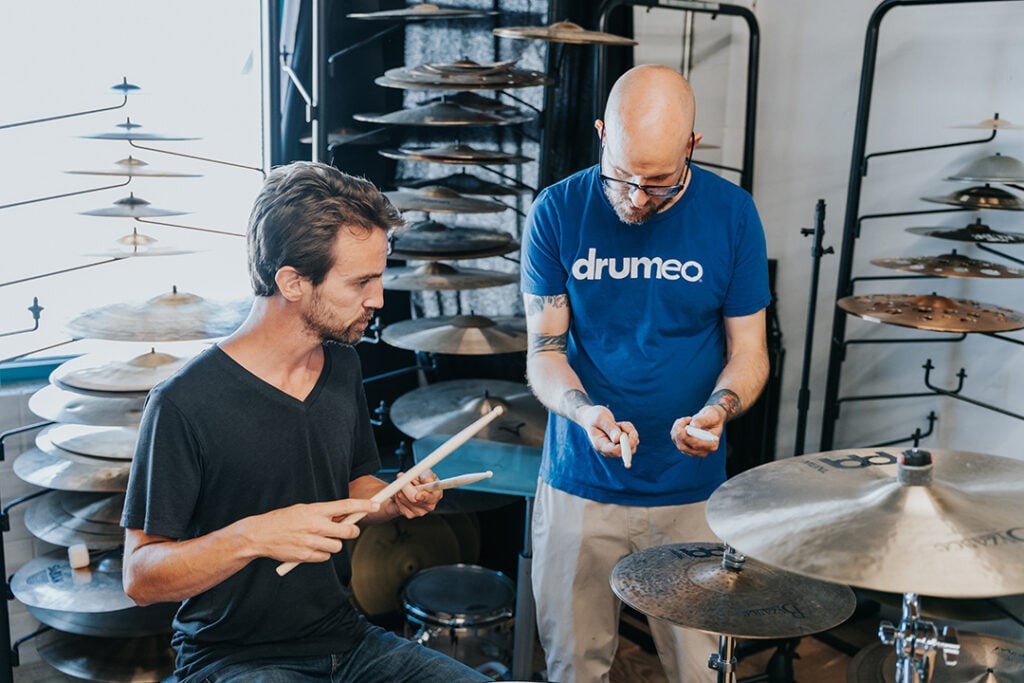
Drummers are in demand
It’s hard to find a good drummer. Not only is it less popular than the guitar, but drummers have less room for error in a band setting. When the guitarist makes a mistake, barely anyone will notice. But when the drummer makes a rhythmic mistake, it’ll be more obvious. Because of this, the standard for drummers is set a little higher.
Many drummers play in multiple bands because they’re in such high demand (and because it’s fun).
Guitar is an adaptable instrument
Guitar gives you access to almost every aspect of Western music. It’s primarily a rhythm instrument, but you can also play single-note melodies and create harmony with chords. On top of all that, you can bend notes, allowing you to access all the in-between notes as well. Guitar ultimately gives you the flexibility and freedom to do just about anything.
It’s a great songwriting tool
Rivaled only by the piano, the guitar is the most popular instrument among songwriters. This is because it’s so easy to play guitar while singing and it’s not cumbersome to move around or travel with one. By using a capo, you can also access every chord in any key while only knowing how to play the most basic open chords.
If you want to write songs on guitar, you don’t need to be a virtuoso to get started.
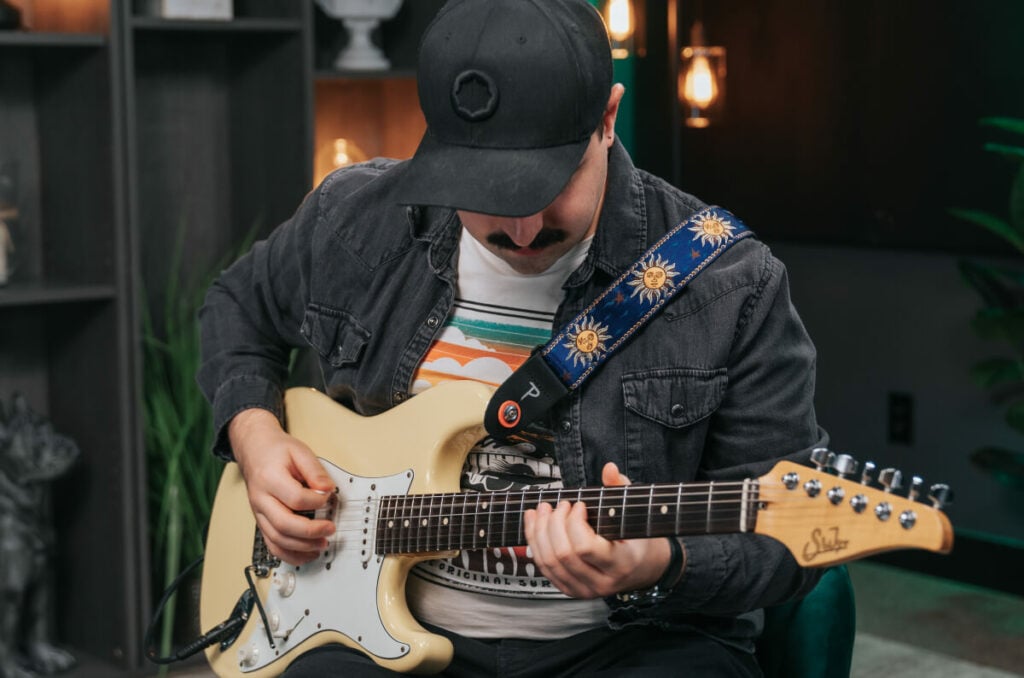
It’s easy to learn to sing while playing
As previously mentioned, when compared to other instruments, the guitar is fairly easy to play while singing. Since many of the movements you’ll make while playing the guitar are small, you won’t likely find yourself out of breath or struggling to keep your voice steady.
Keep in mind that while it poses less of a challenge than other instruments, learning to sing while playing the guitar still requires dedication and practice to master.
Music theory can be transferred to other instruments
Music theory is a language that can be shared between multi-instrumentalists. This makes it especially useful as a communication tool. But it’s also the foundational “code” or “operating system” around which instruments are built. This shared code makes it possible to transfer your knowledge from one instrument to another – giving you an advantage over those learning from scratch.

The drums are physically demanding
Playing the drums is a full body experience. You’ll need to engage your arms, legs, fingers, toes, and everything in between to get the most out of your instrument. While some prospective players might see this as a benefit, it does mean that a baseline level of physical fitness is required to play the drums effectively.
However, while serious drummers are athletes, the drums could be the tool you need to help you get in shape.
Acoustic kits are loud
Technology advances every year, and with that comes some major improvements to electronic drum kits. However, nothing beats the real thing. And the real thing is loud. If you live in an apartment or shared dwelling and don’t have an isolated space to practice, an acoustic kit is usually out of the question.
There are ways to play drums quietly in an apartment, but it will take some effort!
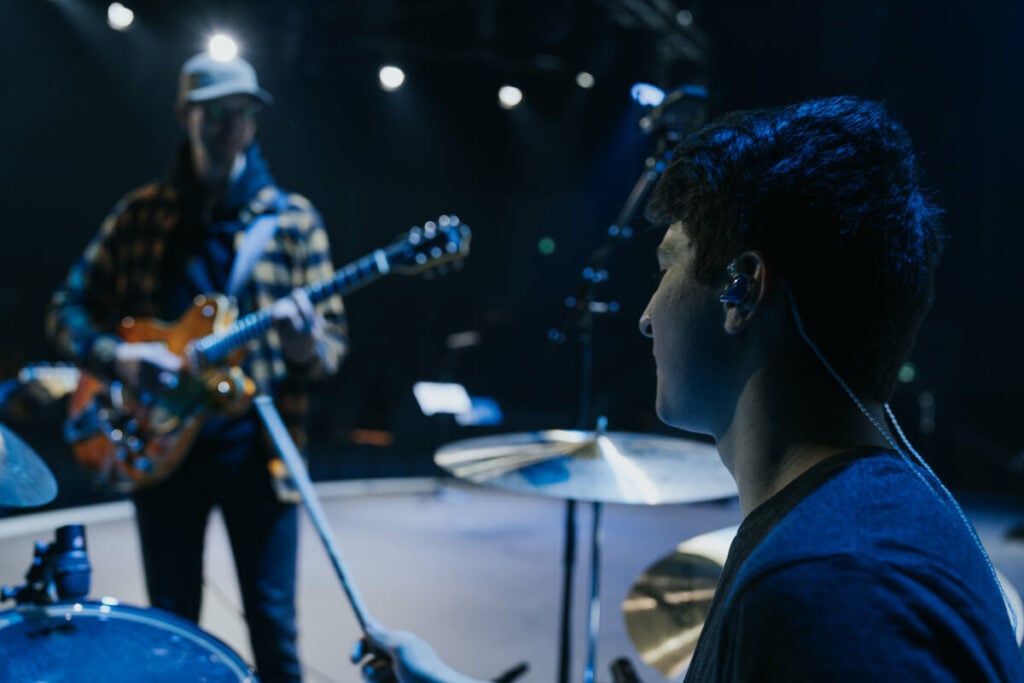
It’s hard to be a songwriter if you only play the drums
If you want to write your own songs, you’ll probably have to get out from behind the kit. Since drums don’t produce melodies or harmonies like what you’d get from a guitar or piano, you won’t be able to write music in the traditional sense. So if you see yourself wanting to compose a song or two down the road, this is one reason why drummers should learn another instrument (like guitar or piano) along the way.
Of course, there’s nothing stopping you from writing drum beats and then asking other musicians to compose over top!
You’re the backbone of the band (no pressure)
As a drummer, it’s your job to serve as the backbone of the band. It’s on you to decide on the tempo, dynamics, and feel. While many drummers love this aspect of the instrument, it can bring a lot of pressure when you’re first trying to play with other musicians.
It can be challenging to sing while playing
Phil Collins might beg to differ, but because of the physical nature of playing the drums, it can be tough to control your voice as you play. If singing is something you want to do, you’ll need to work on keeping your body steady as you drum so your voice doesn’t sound shaky. You’re already coordinating three or four limbs – imagine five-way coordination!

You won’t learn music theory as it relates to other instruments
Music theory is one of the most important parts of music. But as a drummer, a large portion of it – namely melodic theory – doesn’t apply to you the way it applies to other musicians. This causes many drummers to neglect ever learning these missing pieces, which makes it harder to communicate ideas with collaborators or bandmates.
Your fingers will hurt
When you first start learning to play the guitar, your fretting fingers will feel like they’re on fire. It takes weeks (if not months) to develop strong callouses so the metal strings on the guitar don’t have such a severe effect on your fingertips. It’s important to note that if you take breaks from playing your guitar, this pain will return, and you’ll have to rebuild that thicker skin all over again.

It takes a while to develop freedom
Unlike many other instruments, playing guitar requires you to sync up two dissimilar movements to produce a note or chord. Striking the string(s) while you place your fretting hand in the correct position requires a lot of dexterity. And since you’ll need to perform these actions in tandem every time you want to play something, it can take a while before you start producing anything musical.
Guitar players are a dime a dozen
Since the guitar is the most popular instrument in the world, there are many great guitar players out there. This means there’s a lot more competition when it comes to scoring a spot in a band or project. So if your goal is to break out of your basement, it’s important to do what you can to make yourself stand out from the crowd!

They get you developing skills that support each other
Playing the drums is a great way to support the rhythmic aspect of your guitar playing – and the guitar can be an awesome secondary instrument for drummers looking for a songwriting tool.
Learning both can make you a more versatile musician
It goes without saying that being able to play multiple instruments makes you much more versatile. And when you’re looking for gigs, being able to fill different roles opens you up to even more opportunities.
You’ll be able to communicate more effectively
Having knowledge of how different instruments are played makes it much easier to communicate your ideas with other band members – just another way to keep the creative process moving smoothly.
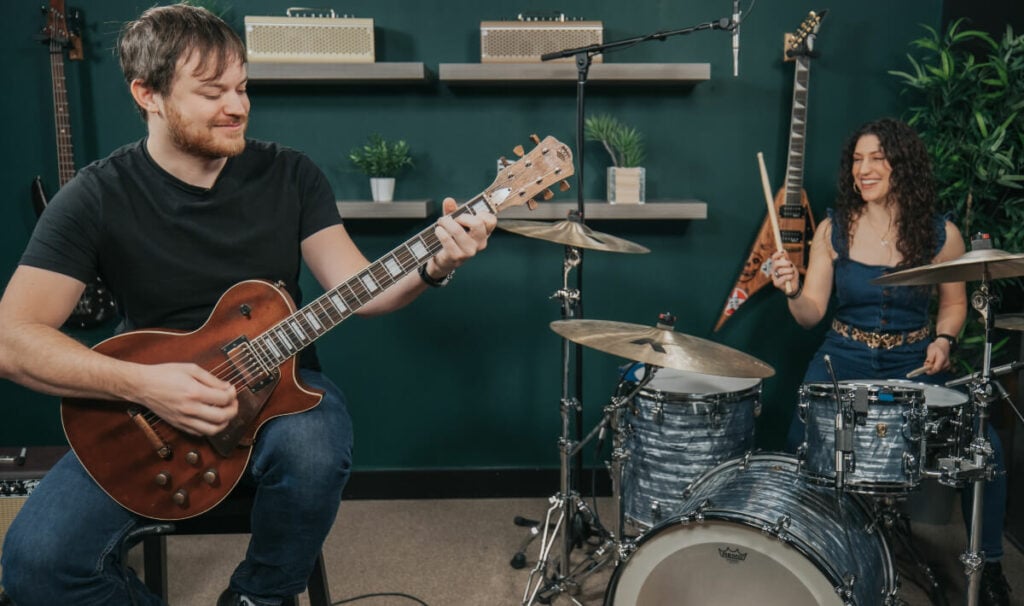
In the long run, both drums and guitars end up costing about the same. It’s just as easy to spend thousands of dollars on a drum kit as it is to spend thousands of dollars on a guitar, amp, and pedals. And any veteran of these instruments will tell you that just one guitar or drum kit is never really “enough.“
When it comes to beginner gear, a guitar usually comes in a couple hundred dollars cheaper than a full drum kit. This won’t always be the case, but it’s typically easier to find a decent beginner guitar for less.
Keep in mind that no matter what stage you’re at, you’ll need to factor in consumables like guitar strings and drum heads as well. Guitar strings are cheap but will need to be changed every month or two. Drum heads are a little pricier but can be changed 1-3 times per year if you aren’t a full-time gigging/recording drummer.
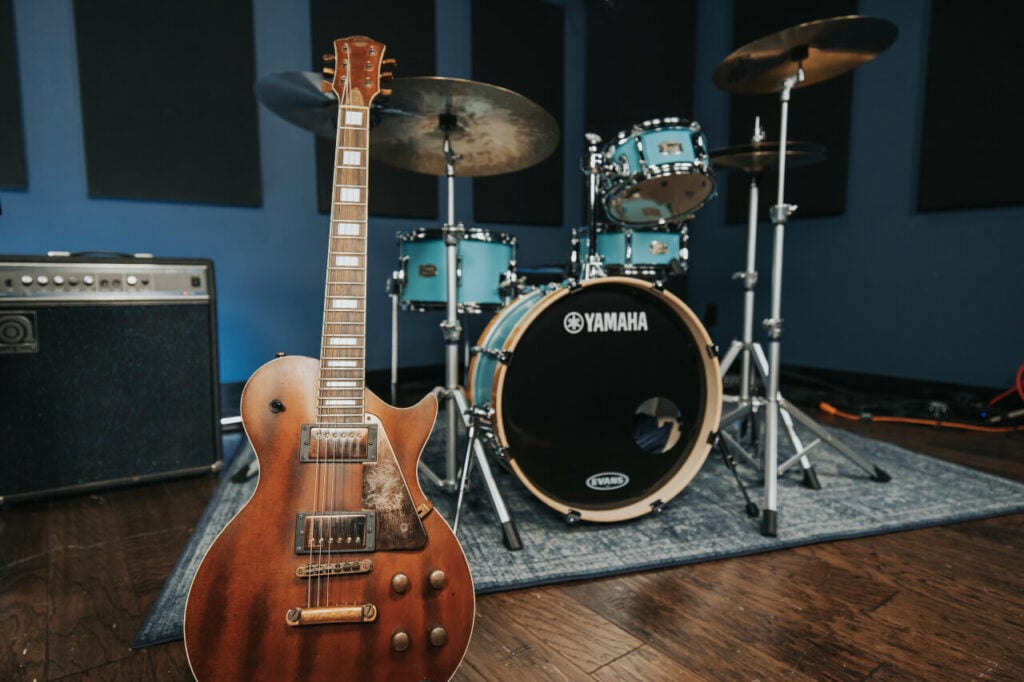
Try learning both!
Whether you choose drums or guitar, playing music is one of the most fulfilling things someone can do with their time. If you still aren’t sure which instrument you want to learn, get a free 7-day trial to Musora (home of Drumeo and Guitareo) and get access to thousands of drum and guitar lessons, play-along songs, world-class lessons and more.
Edited by Sam Landa, Content Marketing Manager at Drumeo
Drumeo Team - We're professional, award-winning drummers and drum teachers, coaches, recording artists, and content specialists who are passionate about drums and helping drummers around the world. This post was written and/or edited by Sam Landa, Brandon Toews, Jared Falk, Dave Atkinson, or another pro on our team (which has a combined 1000+ years of drumming experience). Are you looking for inspiration, education, and support to take your playing to the next level? Join the Drumeo community today!


By signing up you’ll also receive our ongoing free lessons and special offers. Don’t worry, we value your privacy and you can unsubscribe at any time.
We use cookies for traffic data and advertising. Cookie Policy »